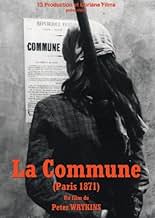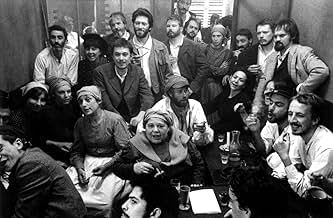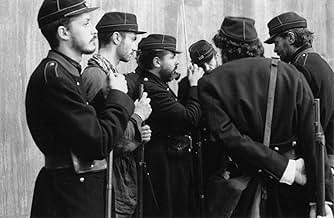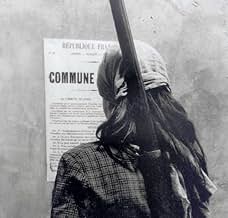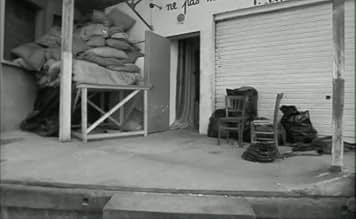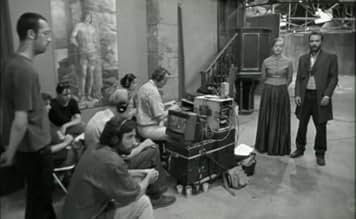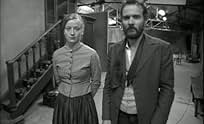La commune (Paris, 1871)
- 2000
- 5h 45min
NOTE IMDb
8,0/10
1,4 k
MA NOTE
Dans ce drame de guerre qui gomme la frontière entre documentaire et fiction, la classe ouvrière et la bourgeoisie parisiennes du 19e siècle sont interviewées et filmées par la télévision, a... Tout lireDans ce drame de guerre qui gomme la frontière entre documentaire et fiction, la classe ouvrière et la bourgeoisie parisiennes du 19e siècle sont interviewées et filmées par la télévision, avant et pendant un soulèvement d'ouvriers tragique.Dans ce drame de guerre qui gomme la frontière entre documentaire et fiction, la classe ouvrière et la bourgeoisie parisiennes du 19e siècle sont interviewées et filmées par la télévision, avant et pendant un soulèvement d'ouvriers tragique.
- Réalisation
- Scénario
- Casting principal
- Récompenses
- 1 victoire et 1 nomination au total
Avis à la une
This is a pretty exhilarating idea.
Take a period in history where its all about collective points of view. In other words, select a time where the movies chosen by groups clash. Its better if it a time before movies and in a place that believes they know something about movies.
Introduce it as a movie, with interviews first with actors and then with characters. Then, action (with characters glancing at the camera), but wait.
Soon we see that inside the movie, we will see reporting by a TeeVee news crew. This is displayed in two forms within the film.. We see the news broadcast and the Parisans watching it.
They are of course biased in favor of the royalist government. So just as the rabble revolt against the government, we have an alternative TeeVee crew enlisted, who also go around interviewing the crowd as well, all obviously amateur actors, not starving, not sick, toothless and in pain.
We are introduced to characters who introduce themselves as fictional characters. We see the two TeeVee reporters take on the character of the events we see, and get blamed for the whole thing, history writing itself. It is the only example I know of this particular type of fold, where our notion of history as retrospective watching is folded into on-screen watchers.
But at so many hours, its a long slog because there is some conflating of French history with French film history, and its just not as profound as they suppose.
Ted's Evaluation -- 2 of 3: Has some interesting elements.
Take a period in history where its all about collective points of view. In other words, select a time where the movies chosen by groups clash. Its better if it a time before movies and in a place that believes they know something about movies.
Introduce it as a movie, with interviews first with actors and then with characters. Then, action (with characters glancing at the camera), but wait.
Soon we see that inside the movie, we will see reporting by a TeeVee news crew. This is displayed in two forms within the film.. We see the news broadcast and the Parisans watching it.
They are of course biased in favor of the royalist government. So just as the rabble revolt against the government, we have an alternative TeeVee crew enlisted, who also go around interviewing the crowd as well, all obviously amateur actors, not starving, not sick, toothless and in pain.
We are introduced to characters who introduce themselves as fictional characters. We see the two TeeVee reporters take on the character of the events we see, and get blamed for the whole thing, history writing itself. It is the only example I know of this particular type of fold, where our notion of history as retrospective watching is folded into on-screen watchers.
But at so many hours, its a long slog because there is some conflating of French history with French film history, and its just not as profound as they suppose.
Ted's Evaluation -- 2 of 3: Has some interesting elements.
Other viewers' comments (thus far) encapsulate most of my feelings about this amazing film (shot on high-quality B&W video, actually). I would add that La Commune divides naturally into two parts, and would be comparatively easy viewing on different nights. The most dramatic moments, obviously, are in the second half - not just the scenes of the Communards defending Paris, but seeing more of the actors commenting on the project, which is when Watkins' strategy of having them react "as" the people they are portraying rather than simply giving them lines to read, really pays off. Personally, I'm glad I was able to see the whole thing build up to those moments.
But however you decide to do it, see La Commune. It will move you and make you think about your (very real!) ability to be a political actor, to make a difference, to take control of your life, even in a terrible time like the present. To use a much overused word, it's empowering.
But however you decide to do it, see La Commune. It will move you and make you think about your (very real!) ability to be a political actor, to make a difference, to take control of your life, even in a terrible time like the present. To use a much overused word, it's empowering.
Almost 6 hours long, this epic and enlighten looked at revolt and innovative political popular innovation and inspiring uprising of the commune in 19th century Paris is long and starts slow. It is self-reflective, free and breaks the 4th wall since the first frame and increasingly throughout the film.
The first part focuses on the background and beginning of the revolt and resistance. It explains the inequalities, the education gap, the history and bourgeois, military and blue collar vantage points.
Themes of women rights and education are abundantly explored and counterpoints are somewhat given although the work is clearly socialism and rightly so.
Mainstream media, its biases and impact are explored and although historically TV reporting did not exist at that time. adds an element of modernness, contrasted with the black and white and first-time actors in characters with costumes and minimal decor. The clear and more subtle subterfuge and power of religious authority is well confronted. Same as the military might and oppression as necessity versus violent resistance and what violence entails.
The nonprofessional actors who have been instructed to research their historical characters, the history and facts and to speak their own mind are asked to come out of characters many times in the second, slightly longer part and the beauty and brillance of the film is now in full boom.
Actors and characters discuss turn of the millennium and other 20th century realities like other resistances, fights, wars, repression and innovations including technology. Television, internet, mobile phones and the rest are pacifiers or cause for more unrest? What are we fighting for today and how will it be tomorrow? What and why should we fight? How? Within with morale compass and rules? Many crucial questions are raised and many valid points advanced. All of them still relevant and real today as in 1999 or 1871.
A must-watch film for any conscious moviegoer or any worldwide school children. Enjoy, think, discuss, share.
The first part focuses on the background and beginning of the revolt and resistance. It explains the inequalities, the education gap, the history and bourgeois, military and blue collar vantage points.
Themes of women rights and education are abundantly explored and counterpoints are somewhat given although the work is clearly socialism and rightly so.
Mainstream media, its biases and impact are explored and although historically TV reporting did not exist at that time. adds an element of modernness, contrasted with the black and white and first-time actors in characters with costumes and minimal decor. The clear and more subtle subterfuge and power of religious authority is well confronted. Same as the military might and oppression as necessity versus violent resistance and what violence entails.
The nonprofessional actors who have been instructed to research their historical characters, the history and facts and to speak their own mind are asked to come out of characters many times in the second, slightly longer part and the beauty and brillance of the film is now in full boom.
Actors and characters discuss turn of the millennium and other 20th century realities like other resistances, fights, wars, repression and innovations including technology. Television, internet, mobile phones and the rest are pacifiers or cause for more unrest? What are we fighting for today and how will it be tomorrow? What and why should we fight? How? Within with morale compass and rules? Many crucial questions are raised and many valid points advanced. All of them still relevant and real today as in 1999 or 1871.
A must-watch film for any conscious moviegoer or any worldwide school children. Enjoy, think, discuss, share.
Truly exceptional film making really breaking down the barriers of what is storytelling and letting everything run free. Peter Watkins does what would seem the impossible, not only create a realistic re-enactment of the commune in Paris (just after the siege of the Prussians and the exile of the bourgeois to Versailles) using only an abandoned warehouse and 200 odd unemployed French citizens and illegal immigrants but also to on top of that add a detailed and amazing social experiment. Putting these people through this experience and then have them portray not only their 1871 characters but also themselves in the one film. To hear these people talk about life today and draw parallels between the film they are making and the lives they lead is quite invaluable information. And as if that alone wasn't enough there is the whole other element of the media and how sides are formed and why people believe what they do and how things are taught and passed down so that divides never seem to cease. The use of reporting and television and newspapers really give this film a whole other level from which to operate and constantly throughout the film one has to ask themselves "who do I believe, do I believe anyone" "why am i believing what this person says and not this person" then as if one hasn't had enough thinking to do already you then, like the cast, have to project forward to today and ask yourself who do i believe when it comes to the reporting of current events? Am I receiving an accurate picture of what is occurring? I don't think anyone who offers themselves up to this 6 hour masterpiece can look at the media in quite the same way. Once again I just have to say this film is without a doubt set to become a masterpiece to filmmaking and I urge anyone who happens to see it on a program for a festival or perhaps even on television to sacrifice those few hours, you wont be disappointed. Also is you are left in awe after its viewing as I was then look out for the Universal Clock- The Resistance of Peter Watkins, it acts as a sort of "making of" but is a film in its own right and gives insight to what it was like to be involved in the making of Le Commune Paris 1871
Peter Watkins' nearly 6-hour long docudrama, "La Commune (Paris, 1871), is a surprisingly passionate and fast-moving lesson in history. It is also a brilliant demonstration of how history is shaped, and re-shaped, by the tellers of the tale.
Using the "You Are There" approach of earlier radio and TV days, Watkins has a male and female news team from "Commune TV" wandering through the poorest district of Paris inviting people to express their grievances against the state to the camera.
While the people bitterly suffer because of the government's inept defeat at the hands of the Germans during the Franco-Prussian War, their anger inspires solidarity for them throughout Paris, and although they briefly rise up and seize power, they are brutally put down in the end.
Ironically, during the course of their uprising, a TV monitor in the background features happy-talk "Versailles TV" news anchors, who continually vilify the Communards and rationalize the government's brutal acts of suppression.
"La Commune (Paris, 1871)" is a must-see for students of history, and a must-see for students of the media.
Using the "You Are There" approach of earlier radio and TV days, Watkins has a male and female news team from "Commune TV" wandering through the poorest district of Paris inviting people to express their grievances against the state to the camera.
While the people bitterly suffer because of the government's inept defeat at the hands of the Germans during the Franco-Prussian War, their anger inspires solidarity for them throughout Paris, and although they briefly rise up and seize power, they are brutally put down in the end.
Ironically, during the course of their uprising, a TV monitor in the background features happy-talk "Versailles TV" news anchors, who continually vilify the Communards and rationalize the government's brutal acts of suppression.
"La Commune (Paris, 1871)" is a must-see for students of history, and a must-see for students of the media.
Le saviez-vous
- Versions alternativesIn December 2002 Peter Watkins started the editing of an abridged theatrical version. In a prologue he expresses his views on discovering that the production company, 13 Production, has financial links with the Lagardère Group (which sells Military Weapons through Matra), then he warns the audience about how much of the sequence shots and live debates from the original full-length movie have been lost in the process of reducing the running time by more than 2 hours to 3 hrs 1/2.
- ConnexionsFeatured in L'Horloge universelle : la résistance de Peter Watkins (2001)
Meilleurs choix
Connectez-vous pour évaluer et suivre la liste de favoris afin de recevoir des recommandations personnalisées
- How long is La Commune (Paris, 1871)?Alimenté par Alexa
Détails
Box-office
- Montant brut aux États-Unis et au Canada
- 5 340 $US
- Week-end de sortie aux États-Unis et au Canada
- 2 930 $US
- 6 juil. 2003
- Montant brut mondial
- 21 641 $US
- Durée
- 5h 45min(345 min)
- Couleur
- Mixage
- Rapport de forme
- 1.66 : 1
Contribuer à cette page
Suggérer une modification ou ajouter du contenu manquant


